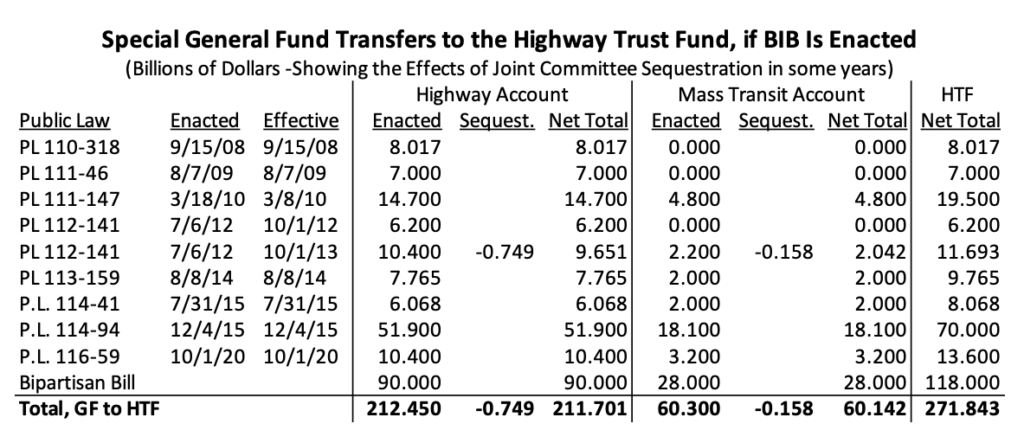Four lamentations about a bad infrastructure bill
From the standpoint of the climate crisis, the infrastructure bill that passed the Senate is, at a minimum, a tremendous blown opportunity. Transportation, especially private cars, are the leading source of greenhouse gas emissions in the US. We have an auto-dependent, climate-destroying transportation system because we’ve massively subsidized driving and sprawl, and penalized or prohibited dense walkable urban development. The Senate bill just repeats the epic blunder of throwing more money at road building, and even worse this time, drivers are excused from paying the costs of the bill—a triumph for asphalt socialism.
You’ve probably seen “BIB,” Michelin’s famous cartoon mascot for its tires (and tourist guides). Coincidentally—and perhaps appropriately—BIB is the nickname of the Senate-passed bi-partisan infrastructure bill. and the animated stack of tires is an fitting mascot for the legislation. It’s all about driving and jovially oblivious to the deep systemic problems in our approach to transportation finance.

Others, including Transportation for America, NACTO, Streetsblog, the Eno Foundation and Politico have written about the details behind the bill. You should definitely read their analyses. But allow us to pull out just four themes—lamentations, if you will—that explain why this triumph of bipartisanship is a disaster for safety, climate, and fiscal responsibility.
1. $200 billion for more deadly, climate killing highways. The centerpiece of the bill is more money for roads and bridges, which in practice means wider roadways and more capacity. The Senate Bill writes a $200 billion check for state highway builders, which is likely to fund wider roads and bridges that will generate more traffic, more pollution, more climate-destroying greenhouse gases, and more sprawl. The National Association of City Transportation officials observes:
. . . the infrastructure bill passed today by the Senate keeps our nation on an unsafe and unsustainable path. It continues to prioritize building the infrastructure that most contributes to the U.S.’s worst-in-class safety record and extraordinarily high climate emissions: new highways. With transportation as the largest source of U.S. climate emissions, and 80% of those coming from driving, the Senate’s bill goes in the wrong direction, giving a whopping $200 billion in virtually unrestricted funding to this unsustainable mode.
Ironically the Senate passed the bill the same week the International Panel on Climate Change released its latest and most dire warning about the damage done by these greenhouse gas emissions. The Senate Bill not only does nothing, but promises to squander vastly more resources to make the problem worse.
2. No accountability for climate, safety or good repair. It’s a considerable exaggeration to say we have a federal “transportation policy.” In effect, while it mouths a national interest in a safe, well-maintained and sustainable transportation system, the Senate bill just continues a system in which the federal government writes huge checks to state highway builders and . . . looks the other way. There are no requirements with any teeth that hold states accountable for the most basic of outcomes, and the Senate bill continues this system, as Beth Osborne of Transportation for America explains.
. . . the Senate also supercharged the highway program with a historic amount while failing to provide any new accountability for making progress on repair, safety, equity, climate, or jobs access outcomes.
3. Inequitable asphalt socialism, and the cynical joke of “user pays”. The great myth of road finance in the US is that we have a “user pays” system. Truth is that’s never been the case, as road users have forever been subsidized, and shifted the social, environmental and health costs of the road system off onto others. The Senate had no stomach for asking road users to pay a higher gas tax to support roads, so instead, they’ve turned the highway “trust fund” into the trust-fund baby of the BIB, getting a huge infusion of general fund money, which will simply be added onto the national debt, with the costs ultimately being repaid, with interest, from income taxes.
An analysis by the ENO Foundation shows that the Senate bill transfers $118 billion to the highway trust fund from the general fund, bringing the total amount of the bailout of highway funds to more than $272 billion since 2008.
We know that despite Congress dumping more than $200 billion of general fund revenue into the highway portion of the fund, that car apologists will continue to make the false argument that we have a “user pays” system, and that spending money on any non-auto form of transportation is somehow stealing from drivers. This bill completely disconnects use of the transportation system from the obligation to pay for its costs: what we call asphalt socialism.
4. We could have done better. House Transportation and Infrastructure Chair Peter DeFazio managed to engineer passage of a decent stab at transportation reform in the House, only to see it “gutted and stuffed” by the Senate.
The bill that passed the House earlier this year contained provisions that at least gently nudged expenditure priorities in favor of “fix-it first” policies that would put repairs ahead of expansion, would require at least an effort to consider how highway construction leads to greenhouse gas emissions, and would have held states accountable for actually improving safety (rather than just talking about it). All that language was purged from the Senate BIB.
Politico‘s Tanya Snyder offers a succinct insider explanation of the politics of the bill from an anonymous former congressional staffer:
“It’s not that it was bipartisan; it was a least common denominator approach,” said the former aide, who worked on the transportation bills that Congress enacted in 2012 and 2015, both of which were hailed as triumphs of bipartisanship. Larger ambitions, he said, “fail to get addressed because of the insistence on staying in the very, very narrow area of bipartisan agreement and we recreate the status quo.”
So what the BIB really does is recycle and perpetuate a badly broken transportation finance system that promises to make our climate, community, health and transportation problems worse, not better.

